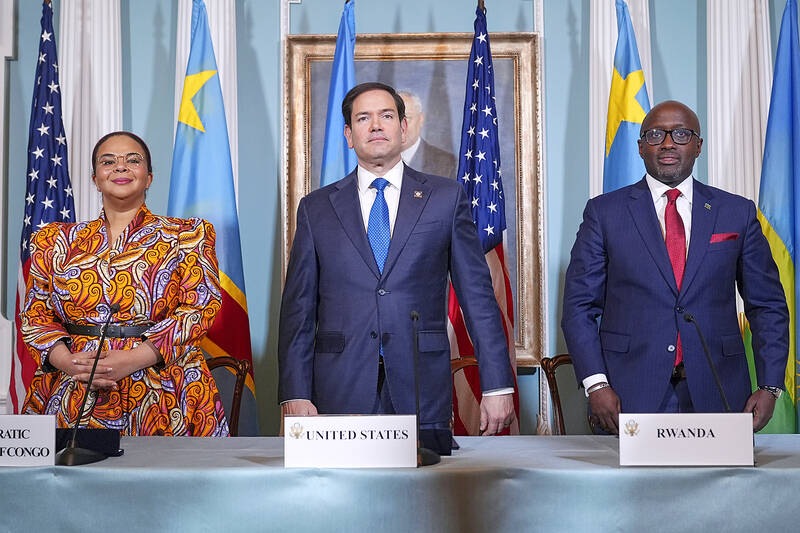Rwanda and the Democratic Republic of the Congo (DRC) were to sign an agreement in Washington yesterday to put an end to a conflict in the eastern DRC that has killed thousands, although broad questions loom on what it would mean.
However, the agreement has also come under scrutiny for its vagueness, including on the economic component, with the administration of US President Donald Trump administration eager to compete with China and profit from abundant mineral wealth in the long-turbulent east of the vast DRC.
The M23 rebel group in late 2021 launched a new offensive that it escalated sharply early this year, seizing broad swathes of territory including the key eastern DRC city of Goma.

Photo: AP
The Kinshasa government has long alleged that M23, consisting mostly of ethnic Tutsis, receives military support from Rwanda. These claims are backed by Washington.
Rwanda has denied directly supporting the rebels, but has demanded an end to another armed group, the Democratic Forces for the Liberation of Rwanda (FDLR), which was established by ethnic Hutus linked to the massacres of Tutsis in the 1994 Rwanda genocide.
The Rwandan and DRC ministers of foreign affairs were to sign the agreement in the presence of US Secretary of State Marco Rubio, US Department of State spokesman Tommy Pigott said.
The White House also said Trump would meet the foreign ministers in the Oval Office.
In a joint statement ahead of the signing, the three countries said the agreement would include “respect for territorial integrity and a prohibition of hostilities” as well as the disarmament of all “non-state armed groups.”
The statement also spoke of a “regional economic integration framework” and of a future summit in Washington bringing together Trump, Rwandan President Paul Kagame and DRC President Felix Tshisekedi.
On the eve of the signing, news outlet Africa Intelligence reported that the deal asked Rwanda to withdraw its “defensive measures” and for the DRC to end all association with the FDLR.
Rwandan Minister of Foreign Affairs Olivier Nduhungirehe on X denied the account.
Congolese Minister of Foreign Affairs Therese Kayikwamba Wagner, on a visit to Washington in April to jumpstart negotiations on the deal, said that Rwanda should be obliged to withdraw from her country, which has been ravaged by decades of war.
Both countries have sought favor with the US. The DRC — whose enormous mineral reserves include lithium and cobalt, vital in electric vehicles — has pitched an agreement to seek US investment, loosely inspired by the Trump administration’s minerals deal with Ukraine.
Rwanda has been discussing taking in migrants deported from the US, a major priority for Trump.

NEXT GENERATION: The four plants in the Central Taiwan Science Park, designated Fab 25, would consist of four 1.4-nanometer wafer manufacturing plants, TSMC said Taiwan Semiconductor Manufacturing Co (TSMC, 台積電) plans to begin construction of four new plants later this year, with the aim to officially launch production of 2-nanometer semiconductor wafers by late 2028, Central Taiwan Science Park Bureau director-general Hsu Maw-shin (許茂新) said. Hsu made the announcement at an event on Friday evening celebrating the Central Taiwan Science Park’s 22nd anniversary. The second phase of the park’s expansion would commence with the initial construction of water detention ponds and other structures aimed at soil and water conservation, Hsu said. TSMC has officially leased the land, with the Central Taiwan Science Park having handed over the

The Philippines is working behind the scenes to enhance its defensive cooperation with Taiwan, the Washington Post said in a report published on Monday. “It would be hiding from the obvious to say that Taiwan’s security will not affect us,” Philippine Secretary of National Defense Gilbert Teodoro Jr told the paper in an interview on Thursday last week. Although there has been no formal change to the Philippines’ diplomatic stance on recognizing Taiwan, Manila is increasingly concerned about Chinese encroachment in the South China Sea, the report said. The number of Chinese vessels in the seas around the Philippines, as well as Chinese

URBAN COMBAT: FIM-92 Stinger shoulder-fired missiles from the US made a rare public appearance during early-morning drills simulating an invasion of the Taipei MRT The ongoing Han Kuang military exercises entered their sixth day yesterday, simulating repelling enemy landings in Penghu County, setting up fortifications in Tainan, laying mines in waters in Kaohsiung and conducting urban combat drills in Taipei. At 5am in Penghu — part of the exercise’s first combat zone — participating units responded to a simulated rapid enemy landing on beaches, combining infantry as well as armored personnel. First Combat Zone Commander Chen Chun-yuan (陳俊源) led the combined armed troops utilizing a variety of weapons systems. Wang Keng-sheng (王鏗勝), the commander in charge of the Penghu Defense Command’s mechanized battalion, said he would give

AUKUS: The Australian Ambassador to the US said his country is working with the Pentagon and he is confident that submarine issues will be resolved Australian Ambassador to the US Kevin Rudd on Friday said that if Taiwan were to fall to China’s occupation, it would unleash China’s military capacities and capabilities more broadly. He also said his country is working with the Pentagon on the US Department of Defense’s review of the AUKUS submarine project and is confident that all issues raised will be resolved. Rudd, who served as Australian prime minister from 2007 to 2010 and for three months in 2013, made the remarks at the Aspen Security Forum in Colorado and stressed the longstanding US-Australia alliance and his close relationship with the US Undersecretary